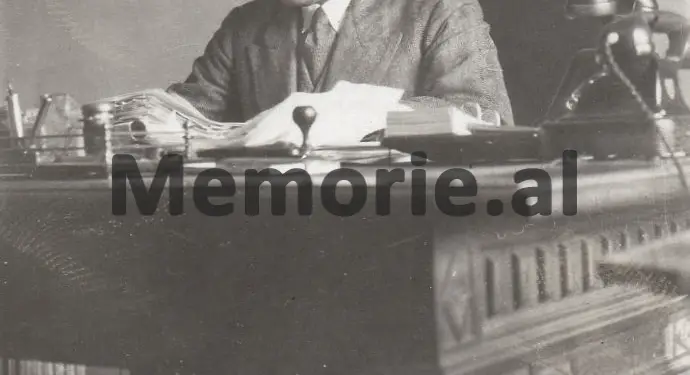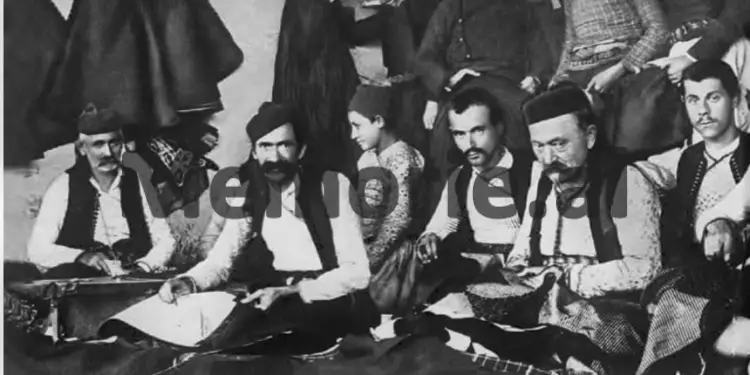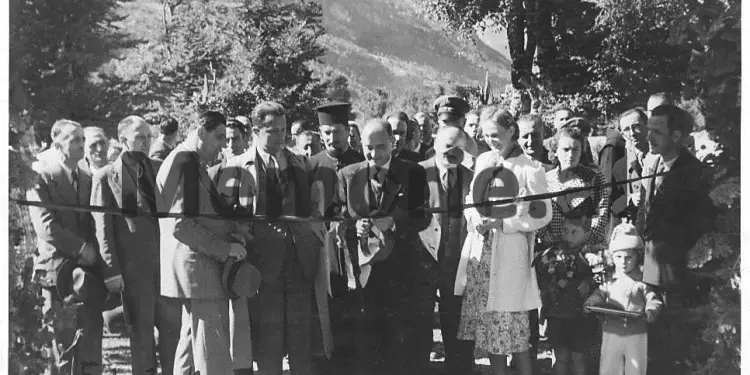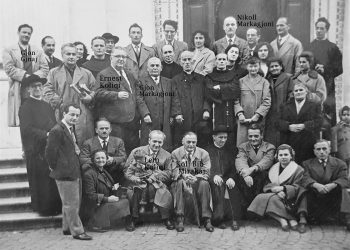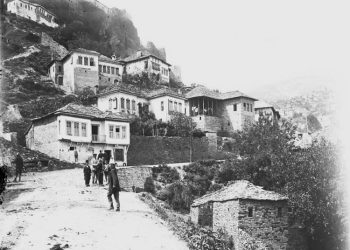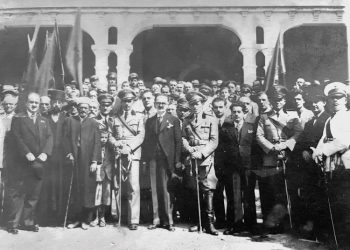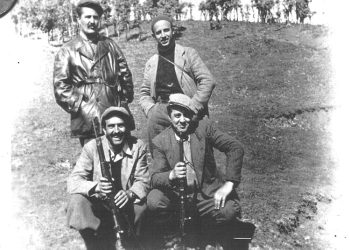By Arben Pustina
The sixth part
– Rrok Gera, a proper statesman –
FORWARD
Memorie.al / This book aims to convey to the public the image of a perfect man, who lived in other times, but who was the best example, not only of what an ordinary man can represent, but, next first, as an example of a noble, distinguished, omniscient and, above all, honest statesman. Having in his genes the noble virtues of his origin, being formed as a personality in a wonderful environment, such as Shkodra at the beginning of the 20th century, and graduating from one of the most prestigious universities in Europe, such as that of In Vienna, Rrok Gera had all the potential to be one of the important figures who gave rise to a rapid development through comprehensive reforms in Albania in the 30s of the last century.
This development reached its peak with the government of Mehdi Frashër, considered perhaps the best Albanian government of all time, formed for the most part by non-political persons, among who was Rrok Gera. For 10 years, or more, as a minister or in other high state functions, he worked with conviction that he was walking on the right path for the consolidation of the Albanian state, a process for which he said he had no time to lose. Economist, financier, diplomat, lawyer, Gera was a specialist who advanced towards the top with his professionalism in an environment where the old factions, which were almost dominant in politics and governance, lost ground in front of young and educated people good.
Continues from last issue
RETURN TO ALBANIA AND ACTIVATION IN THE STATE ADMINISTRATION
Meanwhile, the press of the time, for the relations with which the Prime Minister had promised that they would be very good and there would be a lot of freedom, immediately began to reflect the launch of the reforms promised by the “liberals”, which, first of all, started by establishing order in the state administration. For example, by order of their heads, in various ministries, drinking coffee inside the institution was banned. The newspaper “Vatra”, on November 14, 1935, wrote about a circular of the Ministry of Finance regarding the internal rule:
“…Minister of Finance Mr. Rrok Gera, addressed these days a circular to all Directorates of Financial Offices as well as Customs of the Ministry, on the new waiting time from 11-12 o’clock, decided by the Ministerial Council. Among other things, in the circular it was said textually as follows: Who better than the civil servant appreciates the importance of time, because the civil servant knows how much the visit of a friend, or someone interested, or the complainant who appears in his office outside official time (set for waiting).
While in another paragraph it was written: Undoubtedly, the visitor or the complainant is not harmed, but the State and with it, our people, because the bad service, or not the same for everyone from the employee, paralyzes the result that the State has in sight when there is a system of administration and the law in force.
The circular ends and then they said that if the above provisions are followed, the employees can have time to study the laws of the state, and if the schedule is not respected, warnings, punishments and dismissals will be caused against the financial officers…”. But the demand for discipline at work would be continuous in the Ministry of Finance, at the time when Gera was in charge of it. Even in the circular dated January 7, 1936, addressed to the employees of the Ministry of Finance, directorates and financial and customs offices, Minister Gera requested the most efficient use of the official schedule:
“…It is brought to the attention of all employees that coming to the office late and leaving the office during official hours are not allowed, except in exceptional cases that do not repeat, for which the superior must be aware. Employees who cannot fulfill their duties during official hours are recommended to work overtime, as the office requires the performance of the duties assigned to everyone.
On the same issue, on September 3, 1936, Gera sent another circular to all the employees under him, but this time he seemed to be quite angry because he had just personally observed a lack of discipline on the part of the employees. : “…From one glance, the head of this Ministry took a look at the servants’ quarters with 3 k.m. at 8 o’clock, he found out that in the Directorate of Revenue, some employees at this hour were reading newspapers, some others were walking and some others were chatting. It goes without saying that in this way the working time does not come out – as many employees complain when they are asked for the results of the work. I must remind all the employees that the Ministry is an Institute of work and discipline and not a café or casino…”! Immediately after the arrival of Rrok Gera at the head of the Ministry of Finance, there were competitions for vacant positions.
An innovation in this direction was giving women the opportunity to apply for the positions in question. The results of these competitions were published in the Official Gazette as well as in the main newspapers of the country. In the first days of assuming the office of the minister, Gera ordered the officials of the dicastery to get knowledge about the laws, regulations and instructions related to their duties. Also, always through the circulars of the ministry, he even requested a kind of standard stylization of the filling of papers by the employees of the Ministry, the relevant directorates as well as the financial and customs offices.
In an interview given to the newspaper “Arbënia”, in July 1936, that is, about 10 months from the beginning of his duties as Minister of Finance, while being asked by Nebil Çika about some appointments and personnel transfers, Rrok Gera emphasized that he, he required skill and diligence from the officials of the ministry he led, and even this was a condition for them to remain on the job.
He also noted that it was very important for the employees to be aware of their work and duties. Without this, Gera emphasized in his interview, no serious reform could be started. Regarding the very essence of the reforms, Minister Gera emphasized that, precisely because the country had lost a lot of time in this direction, experiments should not be made to undertake reforms without conducting complete studies and without being 100% sure that these reforms will to give positive conclusions.
In this context, he underlined that, in that July of 1936, the Ministry headed by him was studying large projects, including the projects for the Bank of Agriculture, the tobacco concession, the fish concession, etc. In the first days of the activity of the new government, the focus of the work of the finance department was the financial situation for the first six months of the 1935-1936 financial years.
In the corresponding justifying report, drawn up by him and forwarded to the Parliament, on November 30, 1935, Gera explained that the withdrawals of the following financial year, realized for that period of time, amounted to fr. gold 9,653,312. According to the minister, this amount also included two extraordinary incomes: the participation in the profit of fr. gold 450,000 after the release of silver coins from fr. gold as well as the proceeds from the sale of a large amount of postage stamps, out of use, for fr. gold 105,000.
Based on these data, Minister Gera predicted that the data of the ongoing financial exercise (1935-1936) would result in a fairly high surplus at the end of the financial year, so he submitted several requests for additional funds, where he considered necessary, emphasizing that these additions would be covered by surpluses in the budget:
“…a careful examination of the state of the various previews, brought to our attention, that it is a necessary need for some funds to be added for the reason: that the available fund is currently hindered (and moreover, in some cases they are higher expenses than the fund allocated in the budget, that the funds allocated in the preventive budget have not been well-valued in order to cope with the narrowest needs), that we need to cope with the new expenses that have arisen during these times of lastly and that, finally, it is necessary not to paralyze the activity of some services during the last four months of this financial exercise…”.
During the parliamentary debate on this issue, a number of MPs (among them former ministers of finance), while asserting that this was the first time that requests for increased funds that were thought to be covered by revenue surpluses came to parliament, expressed skeptical about the possibility of budget surpluses. Reacting to the deputies, Rrok Gera repeated his position expressed in the justifying report that “…when new needs are presented, it is the duty of the Government to fulfill these needs and from the review of the budget, after 7 months of activity of the previous government , these needs come to the fore…”.
While in the general perspective of the financial situation in the country, for the years 1930-1935, Gera asserted in the Parliament that, although the consumption budgets of these years had not been prepared yet, according to the figures available to the Ministry of Finance, there were deficits, but the situation could not be was considered alarming:
“…I remember that the situation is not so alarming, on the contrary, I remember that, if you take into account that we have gone through a financial crisis and a very difficult economic crisis within these 2-3 years, – the financial situation has not been possible better. Regarding this project, please accept the additions that are requested, they should not be considered as additions that unbalance the financial situation of our State”. As can be seen from the table below, the financial year 1935-1936, the year in which Rrok Gera led the finance department, is the only one from 1930 to 1939 that the State Budget was in surplus.
We also see that in this financial year the highest surplus was realized, for the period 1925-1939. Income and expenditure of the budget for the period from 1925-1928 to 1938-1939 (in millions of gold francs). Although for the financial year in question Gera contributed as a minister in the second half of his term, we must not forget that he also contributed in this direction as Secretary General of the Ministry of Finance.
Meanwhile, everyday life brought its own problems, and the new government cabinet faced these problems very quickly. In a justifying report, sent to the Parliament, the Minister of Finance, Gera, laid out the need for the purchase by the state of an amount of 12 thousand quintals of wheat for areas such as: Dukagjin, Pukë, Mirditë, Nikaj-Mërtur, Kthëlle, Skrapar, Kurvelesh and Malësia e Lezha, which, according to the information provided by the districts, were in a very difficult situation, mainly because they had not produced grain and for other reasons. In the report drawn up by Minister Gera, it was requested that the amount of corn be given for free to families in difficulty and, in return, the people who would receive it, would contribute to worldly works, mainly in the maintenance of roads.
Thinking that the purchase of such a large amount of corn could cause an increase in the price of this product in the market, the report suggested that the purchase be done in parts, or brought from abroad. In this case, imported corn would be exempt from customs duties. The cost of buying corn, for the areas in question, was estimated to be about 150,000 gold francs, which it was proposed to defray from the coinage of silver coins of 1 or 2 fr. gold, as well as from the sale of a large quantity of out-of-use postage stamps.
draft law for the distribution of this amount of free corn to the poorest families had signs of localism. In his speech in defense of the draft law in question, Rrok Gera emphasized to the deputies that in the drafting of the draft law, the government did not favor any area. Meanwhile, he admitted that the amount of 12 thousand quintals of grain was too small to be distributed to other provinces.
However, the minister promised that the government would continue to study the situation and determine other immediate needs in areas with a difficult situation, to intervene there as well, if necessary. In a case of the purchase of corn for the population, in January 1936, the Ministry of Finance published a proclamation signed by the holder himself. It was about the purchase from abroad of a quantity of corn of 15,000 to 20,000 quintals. Among other things, that announcement draws attention to the rigor regarding the requirements for the quality of the goods and the procedures that would be followed:
“…I saw that many Albanian companies have been directed to be interested in mediating this transaction, we inform all interested parties of the conditions based on which the offers will be presented…! “…In the offer, I must state the provenance of the corn and its type, as well as that the product is plump, dry, odorless and that it does not contain foreign substances outside of the normal rules…! The offers will be presented in closed and sealed envelopes…”.
The focus of Rrok Gera’s activity, how long he was in charge of Albanian finances (as well as before when he was General Secretary), was the continuous supervision of the activity of the National Bank of Albania with its Italian leaders, depending on the situation in foreign exchange markets and the stability of the Italian lira in these markets, since a significant amount of the reserves of the Central Bank were in this currency.
By the middle of 1935, the management of the National Bank of Albania had become worrying for the Swiss, Belgian and Yugoslav advisors (in BKSh, apart from the Italians, there were shareholders from other countries), but also for the Albanian government, which was worried about the devaluation progressive reduction of the reserves of this Bank, due to the lack of protection of the Italian lira in the foreign exchange markets.
Even from the significant devaluation of the dollar, the Central Bank suffered losses, since it had a significant amount of its reserves in the American currency. This situation continued even after the creation of the Frashëri government, which increased the pressure on the Italian leaders of the Bank, so that they would take measures against the sudden devaluation of the Italian currency. Even the minister, Rrok Gera, asked them that the reserves of the National Bank of Greece be completely covered with gold, but this request was rejected by the Italian monetary authorities.
Faced with the choice not to convert the reserves into gold and the duty they had to protect the interests of the institution, the leaders of the Central Bank chose a middle path. In a private memorandum addressed to the Italian Minister of Finance, Thaon de Revel, the National Bank of Albania underlined the significant devaluation of the reserves caused by the devaluation of the Italian lira, so it persistently demanded from the government of Rome, a guarantee for the 41.2 million lira of the reserve than her.
Italy’s Ministry of Finance agreed, but the problem became even more acute on October 5, 1936, when the Italian lira was devalued by 40.94%. On October 6, 1936, the newspaper “Arbënia” published on its pages, the official reaction of the minister Rrok Gera, who, in his communiqué distributed on the evening of October 5, calmed the Albanian opinion, clarifying that the Albanian gold franc was provided: “…Regarding the devaluation of the French franc and that of Switzerland (now followed by the devaluation of the Italian lira), any newspaper in the country has asked to assure the Albanian public that the Albanian currency will maintain its stability.
Although such a statement is redundant, we are bringing to the public’s attention that the Albanian gold franc, based on Article 11 of the Banking Convention, dated March 15, 1925, and Articles 22 and 24 of the Organic Law on the National Bank of Albania, cannot suffer any invalidation during the entire convention, whatever foreign currency is invalidated. Those who know about the balance sheets and who have had the chance to see the balance sheet of the National Bank of Albania, have already established that the Albanian gold franc, in addition to the protection it has on the basis of the aforementioned provisions, is also secured in the high reserves that cover completely. Minister of Finance: Rrok Gera d.v.”.
Intentionally, Gera had not consulted at all with the leaders of the Central Bank, Mosconi and Gambino, about his statement, but then he contacted them, asking them to declare the degree of coverage with reserves of the Albanian currency. In his reserve letter no. protocol 311, dated 07.10.1936, Minister Rrok Gera, notified the Central Headquarters of the National Bank of Albania, with address: Rome, Via Torino no. 107, related to the above communiqué and meanwhile asked the Bank’s managers to notify him if there would be further changes in the exchange rates of foreign currencies.
And with a reserve letter, dated October 14, 1936, the Italian leaders of the National Bank of Ukraine return their answer, once again assuring the Minister of Finance, Gera, that there would be no risk, whatever happened: … “we have the honor to assure you that – by analogy, as was also found in the case of the devaluation of the Sterling and the Dollar – the recent changes in the gold parity of some of the main currencies have not at all affected the reserves of the National Bank of Shqipnis – In fact, the Bank has maintained the principle of using cover reserves only in effective gold, or in other forms that exclude any risk that may arise from changes in the parity of the currencies of other States”.
Meanwhile, Mosconi and Gambino felt it necessary to contact the Bank of Italy, regarding the amount of gold assigned to cover the lira reserve of the National Bank of Greece. For his part, the Governor of the Bank of Italy, Azzolini, referred the matter to the Minister of Finance, Revel, emphasizing that the guarantee for the National Bank of Italy had already been given by the Italian government, so it would not be a burden on the Bank of Italy. .
Under these conditions, the government of Rome had no choice but to authorize the Bank of Italy to set aside from its reserves, the amount of gold necessary to cover all the reserves in lira, of the National Bank of Albania. It was about 3,262.6 kilograms of gold, but the Bank of Italy avoided taking the gold out of the country and the National Bank of Albania decided not to claim the amount of gold. But in the meantime, she requested the equivalent stock in lira, which was calculated at 69.7 million.
Not a single gram of gold entered the BKSh, but to the amount of 41.2 million liras, assigned in 1935 to cover the reserves of this bank by the Italian government, an amount of 28.5 million liras was added, based on the drastic devaluation of the lira in October 1936. Thus, the reserves of the Central Bank increased significantly, reaching 69.7 million Italian liras.
From the various data, it appears that, during the 1930s, the amount of gold reserves of the National Bank of Bulgaria continuously increased, while, on the contrary, the amount of reserves in foreign currencies continuously decreased. If in 1927 there was only 9.8% of the reserves in gold and the rest was in foreign currencies, in 1938 the reserves in gold constituted about 40%, while those in foreign currencies were 47% (the part that remained, it was in Italian treasury bonds) Memorie.al
The next issue follows









